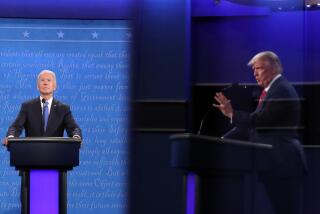‘Are you better off?’ only one of the key questions
CHARLOTTE, N.C. -- Mitt Romney and his fellow Republicans would dearly like the November election to be a referendum on Barack Obama, with Americans voting largely based on a single question: “Are you better off today that you were four years ago?”
President Obama and his team have some difficulty with that query — as evidenced in their Labor Day weekend talk show appearances — and want voters to ponder at least two other questions: If you aren’t better off, who helped dig the hole? And, who do you think is better equipped to pull the country out of its economic malaise?
Polls explain why the framing question is critical: A Gallup survey completed late last month showed that 56% of Americans in a dozen of the most closely contested states said they are not better off than they were four years ago. That’s 2 percentage points more holding the negative feeling than in late 2011. If they all voted that a change would make things better, Obama would be doomed.
But most voters likely ask the second question, about who’s going to make things better. There, Obama has a fighting chance.
The same Gallup poll asked voters if they would be doing better four years from now in an Obama or Romney presidency, they split evenly, 44% to 44%. No wonder, then, that the president said that was the better way to frame the election when he kicked off his campaign in May.
(Gallup polled voters in Colorado, Florida, Iowa, Michigan, Nevada, New Hampshire, New Mexico, North Carolina, Ohio, Pennsylvania, Virginia and Wisconsin.)
Ronald Reagan famously used the “Are you doing better?” question to winning effect in 1980, capping a crucial debate with President Jimmy Carter. Most Americans answered in the negative. Reagan was able to assure enough voters he was not the extremist Democrats depicted and they chose him as a good alternative in difficult economic times.
Romney has worked hard on the campaign trail to get voters thinking about that choice. When asked about the Republican’s problems — his failure to connect with many average voters and the appearance that he is an out-of-touch plutocrat — they routinely retort with the “better off” equation.
PHOTOS: The protests of the GOP convention
No wonder, then , that Obama’s top campaign strategists handled the topic so gingerly (at least initially) when they appeared on television talk shows this weekend.
When ABC’s George Stephanopoulos hit adviser David Plouffe with it, he wouldn’t say “yes, Americans are better off.” Instead, Plouffe offered a multi-pronged response: The country is coming back, has a lot of work left to do and would be better off in the hands of the president than Romney.
How so? Because, Plouffe argued, Romney would return the country to the failed policies of President George W. Bush, which kicked off the recession, and because Romney would favor rich folks like himself — principally by allowing continued tax cuts for upper-income brackets.
Fox News’ Chris Wallace got a similar response Sunday out of David Axelrod, who said the Republicans had created the mess and that Obama and his team still needed some time to “work through it.”
Those two interviews — and the Obama-ites unwillingness to say the country is better off -- got considerable notice from media types assembled in Charlotte, N.C., for the Democratic National Convention this week.
By Monday morning, another top Obama campaign official, Stephanie Cutter, said the country “absolutely” was better off than four years ago. She ticked off reminders of what Obama inherited when he took office.
“Let me just walk you through what life was like four years ago right now,” Cutter said on NBC’s “Today” show. “In the six months before the president was elected, we lost 3.5 million jobs, wages had been going down for a decade, auto industry on the brink of failure. Our financial system, this is just about the time you’re seeing banks go under. All over America middle class families were feeling it.”
It’s almost certain that most Americans on election day will continue to view their lots as worse than they were in 2008. Romney has an upper hand if that is the only question.
Where he still needs some work, though, is persuading voters that he can do more than Obama to make things better. The final two months of Campaign 2012 will center largely on that question.
Follow Politics Now on Twitter and Facebook
Twitter: @latimesrainey
Staff writer Maeve Reston contributed to this report.
More to Read
Get the L.A. Times Politics newsletter
Deeply reported insights into legislation, politics and policy from Sacramento, Washington and beyond. In your inbox three times per week.
You may occasionally receive promotional content from the Los Angeles Times.











